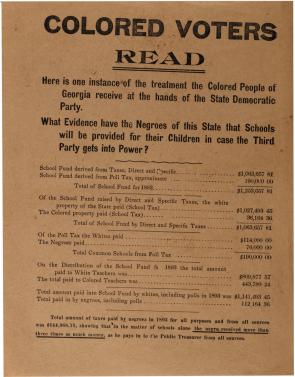Campaigning for the African American vote in Georgia, 1894
A Spotlight on a Primary Source by State Democratic Party of Georgia
 In the gubernatorial and local elections of 1894, the Democrats and the newly formed People’s Party or Populist Party vied for black votes in Georgia. Neither the Democrats nor the Populists called for racial equality in their platforms. Georgia’s Populist Party, led by Tom Watson, however, invited two black delegates from the Colored Farmers’ Alliance to their convention in 1892, and in 1894 appointed an African American to the state campaign committee in an attempt to garner support. The "third party" even called for an end to the state’s convict lease system, which kept African American convicts in bondage. The incumbent Democrats fought back by showcasing their record of "supporting" education for African Americans, as shown in this broadside.
In the gubernatorial and local elections of 1894, the Democrats and the newly formed People’s Party or Populist Party vied for black votes in Georgia. Neither the Democrats nor the Populists called for racial equality in their platforms. Georgia’s Populist Party, led by Tom Watson, however, invited two black delegates from the Colored Farmers’ Alliance to their convention in 1892, and in 1894 appointed an African American to the state campaign committee in an attempt to garner support. The "third party" even called for an end to the state’s convict lease system, which kept African American convicts in bondage. The incumbent Democrats fought back by showcasing their record of "supporting" education for African Americans, as shown in this broadside.
The broadside is an account of the school and poll taxes levied on citizens as well as the amounts given to schools. Although poll taxes, or voting fees, existed sporadically throughout American history, in 1877 Georgia had been the first state to enact a "poll tax" to effectively disenfranchise many poor black voters. A grandfather clause allowed anyone who could vote prior to the Civil War (white men) to retain their right to vote regardless of literacy tests, poll taxes, or other mechanisms.
The Democrats attempted to demonstrate, using the statistics in the broadside, that the system of taxation benefited the education of African American children. In this view, taxes collected from African American Georgians paid for approximately 25 percent of the salaries for black teachers while money collected from white Georgians paid for the other 75 percent. The document ends with the assertion that "the negro received more than three times as much money, as he pays in to the Public Treasurer from all sources." Democrats wanted to convince African Americans with voting eligibility that their schools had been and would continue to be funded if they only voted for the Democratic candidates.
